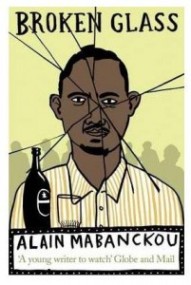Broken Glass
“…what’s this jumble, this mess, this muddle, this mish-mash of barbarities, this empire of signs, this chit-chat, this descent to the dregs of belles-lettres, what’s with this barnyard prattle, is this stuff for real, and where does it start, and where the hell does it end?” and my mischievous answer would be “this jumble of words is life, come on, come into my lair, check out the rotting garbage, here’s my take on life…
This post is my take on Broken Glass, another one of the talented Alain Mabanckou’s oeuvres (he recently won the Grand Prix de la Littérature Henri Gal for his body of works) published in France by Seuil and by Serpent’s Tail in the UK.
When I came upon the words I decided to start this post with, I knew then that my main question about the novel had been asked, and in the answer of Broken Glass, the narrator but also writer (?) of this novel, I had found my answer.
“…what’s this jumble, this mess, this muddle, this mish-mash of barbarities…” and my mischievous answer would be “this jumble of words is life,…”
These words characterise the style of this novel: no capital letters, commas everywhere. Is it because life is not a neat little thing? Neat things have a full stop; life is not neat, and the life of Broken Glass is not neat, nor are the lives of the characters, neat things.
The book blurb reads: In a dilapidated bar in the Congo, a disgraced schoolteacher abysmally fails to stay out of trouble, as one drinker after another wants to ensure their portrayal in the bar’s official record reflects their dynamic, ebullient personality. And how did this idea of an official record come about? In the words of Broken Glass himself: “The boss of the bar Credit Gone West gave me this notebook to fill, he’s convinced that I – Broken Glass – can turn out a book, because one day, for a laugh, I told him about this famous writer who drank like a fish, which shows you should never joke with the boss.”
So Broken Glass writes, and decides to write in his style. At times, I have to admit that I have wondered what issues the book dealt with; what big issues the book dealt with, that is, thereby falling into that trap of what an African writer should write about. Thankfully, I’m not so bogged down with “issues” that I’m unable to enjoy and be perplexed by the ramblings of Broken Glass.
I want to know him – I want to know you; I tell him as I turn the pages of the novel. But Broken Glass is not a silly drunk. He mentions his job, tells us how he lost it, and tells us how his wife left him, but like someone who’s decided to adopt the “let’s get drunk for tomorrow we die” motto, he seems not to care about his misfortunes. In fact he doesn’t see them as misfortunes; just life, but we care. I cared. Alas, the bar’s customers do not have the same laissez-aller attitude about their lives, and certainly not about Broken Glass’ recording of it. They seek him out and tell him about it, insisting he renders a faithful account.
Some reviews have made mention of the fact that the lack of punctuation makes the book a difficult read. I did not find that to be the case and don’t let that put you off. And so, would I recommend this book? Yes.
I have been steadily working my way through Mr Mabanckou’s writings and what I like is that I’m always pleasantly surprised. I don’t tend to have favourite writers, because once you have read one of their books, you have read all of their books. Not so with Mabanckou; the prose is new, the subjects are different and Mabanckou has no desire “to shut himself up in his blackness“,
I also enjoyed the challenge this book presented: it contains 170 classics of international literature, and Serpent’s Tail would love to hear from us if they are all identified. I’ve identified a few – I’m now going to sit down with the book again and a notepad and once I have , I should fire off an email to info@serpentstail.com
So, happy reading, and as always, would love to hear your thoughts!


I just finally got my hands on Alain Mabanckou’s novels :). I’m going to be reading ‘African Psycho’ first but will love to share my thoughts on ‘Broken Glass’ with you once I’ve read it.